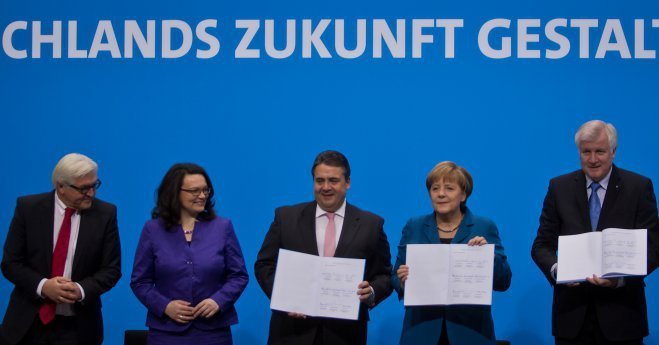The agreement between CDU, CSU and SPD, signed on 27 November for the 18th term was given the title “Deutschlands Zukunft gestalten” (Shaping Germany’s Future). The document mentions the term “European Union” 151 times – but how much does this say about the content? The liberal press for instance regards Germany’s role as the EU’s motor to be seriously endangered. Others complain about Germany’s lack of visions for the EU and consider its general strategic thinking to be absent. Are these merely views of an intellectual opposition or rather solid claims?
Economy
With respect to the circumstances of the southern Member States, the new coalition does not seem to alter its previous course. Although the agreement indeed mentions the possibility for government spending and investments, the passages on austerity measures and budget consolidation are phrased more explicitly. The hopes of those in favour of a “supranational and joint liability” as solutions to the crisis were soundly destroyed.
The continuation of the budget-consolidation policy is not necessarily at odds with future investments for growth. Yet, the government is expected to encounter serious difficulties when seeking to bridge this discrepancy. Additionally, the government will face the difficulty of persuading other European stakeholders on that matter.
The coalition parties agree to foster obligatory conditions for the coordination of economic and budgetary policies. What remains unanswered is whether these efforts will exceed the current mechanisms within the “Europe-2020” framework such as the European Semester. While analysing the Member States’ economic and structural programmes, this mechanism also enables the Commission to issue recommendations for the upcoming 12 to 18 months. However, this mechanism is not binding, a circumstance the coalition partners are seemingly not willing to change. Otherwise they would have chosen a distinct type of language. Regarding the already existing national budget supervision by means of the Two-Pack system, the text remains rather vague. This system equips the Commission with the competence to countervail in case of clear breaches of EU provisions. The parties are determined to upgrade it, aiming at a more effective instrument. The modalities of this update, however, remain highly blurred.
A single sentence entails the most far-reaching implications of the agreement. The coalition is determined to alter the legal provisions of the Economic and Monitory Union. In general, there is nothing to judge about when considering a change to the Treaty. Yet, it can be assumed that the coalition parties are only interested in those changes expanding the competences of the EU.
Foreign and Security Policy
The agreement seeks to enhance the office of the High Representative of the Union for Foreign Affairs and Security Policy (HR). At the same time there is agreement about a “small” European External Action Service, which shall perform functional rather than representative tasks. With regard to the strengthening of national services, such a proposal is legitimate, yet in contrast with the above-mentioned objective.
When it comes to enlargement, there is a positive tone regarding the Western Balkans. Concerning Turkey however, the text is unemotional, thus forgoing an opportunity for clear commitments.
On EU-Russia relations the agreement demands a more coherent European policy. Given the Member States’ differing extents of energy dependence on Russia, the practical implementation of such goal is more than problematic.
The agreement is less conservative on the prospects for new political initiatives to strengthen EU’s Common and Security Policy (CFSP) in the aftermath of the next EU summit. The text remains silent on any further details.
The German Self-Conception in the EU
The above-presented arguments have shown that the new government lacks a European vision. There is a continuous focus on the status quo, while explicit and proactive elements are missing. Above all, this is evidenced in the chapter on European economics, marked by clear language, yet vague contents. The Chancellor and her Finance Minister will continue to act step by step. One should thus not expect an end to the summit cantered decision-making and actions outside the treaties. The message is clear: “The European crisis management shall remain unchanged”. There is only emphasis on and demand for coherence on a verbal level. The parties fail to grasp the momentum for explicit commitments regarding the CFSP or European Data Protection.
The parties do not present neither concrete nor challenging objectives for the EU. In essence, the agreement is one based on the lowest-common-denominator outcome. The SPD, consciously or unintentionally, was unable to implement most of its previously expressed corrections regarding crisis management and economic policy. The EU, however, can be expected to be the bigger loser.



Follow the comments: |
|
